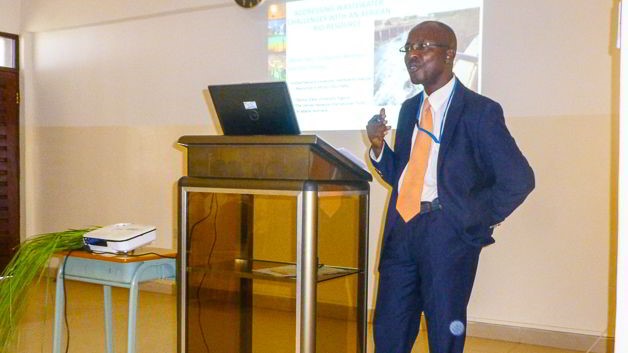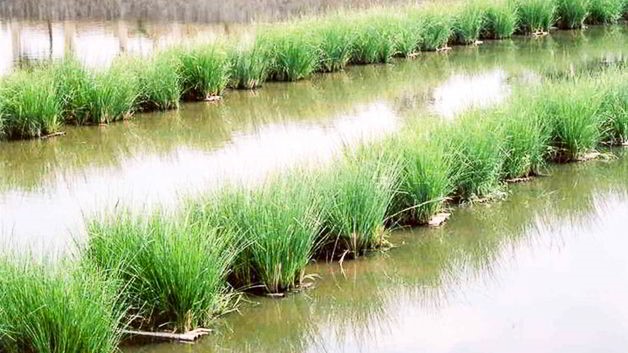
For Immediate Release
UNU-INRA Engages Stakeholders on Wastewater Management
Dr. Effiom E. Oku, Land and Water Resources Fellow at UNU-INRA, making his presentation.. Photo: UNU-INRA
Accra, 1st September, 2015 – The United Nations University Institute for Natural Resources in Africa (UNU-INRA) held a seminar to discuss with stakeholders findings from a research on wastewater management. The seminar was on the theme “Addressing Wastewater Challenges with an African Bio-resource”. The research, which assessed the effectiveness of the African vetiver species “Chrosopogon nitgritana’’ in treating wastewater, reveals that the vetiver grass is effective in removing contaminants from wastewater.
Presenting the research findings at the seminar, Dr. Effiom E. Oku, a Senior Research Fellow for Land and Water Resources, who is also the lead researcher on the project, noted that, wastewater from industries and domestic sources usually contain toxic metals including cadmium, arsenic, copper, lead, phosphorus and nitrate. He added that the use of such effluents for agriculture or domestic purposes, or simply human exposure to wastewater, poses health risks. Citing various diseases such as diarrhoea, kidney failure, liver damage, cancer and skin diseases that can be caused by contaminated water, Dr. Oku emphasised the need to treat wastewater before using it for crop irrigation or for other purposes.
The research approach involved collection of effluents from fertiliser blending companies, quarry sites, cassava processing factories, abattoirs, leachates from on-engineering dump sites, crude oil polluted water and urban wastewater from drainage sites. The effluents collected were treated with the African species of the vetiver grass.
Speaking on the key findings, Dr. Oku noted that “the comparative results of pre and post-treatments of the wastewater and laboratory analyses showed that, the African species of vetiver grass is capable of reducing toxic heavy metals in effluents to the internationally accepted limits as per guidelines by the World Health Organisation (WHO) / Food and Agricultural Organisation (FAO) or the United States Environmental Protection Agency (USEPA).
Taking the participants through the application of the vetiver technology, Dr. Oku outlined the following steps:
- Dig vetiver grass from the soil, wash and prune the root;
- Make holes in a floating material and plant vetiver in them;
- Put the vetiver in nutrient water and allow for 10 weeks for root & shoots to sprout;
- Lift & immerse the vetiver in effluent and allow to stay to absorb the contaminants;
- Periodically lift-up and prune roots and shoots at least three times in a year, for maintenance.
Vetiver grass being used to treat wastewater. Photo: Paul Truong, the Vetiver Network International.
For the participants, the findings of the study are impressive, offering a simple and practical technology that can be used to treat wastewater. Commenting on the research, Mr. William Okoe, Assistant Programme Officer of the Environmental Protection Agency (EPA) – Ghana, indicated:
“The EPA is currently undertaking a project that is using treated wastewater for tree planting, and I think that this vetiver technology is an excellent proposal, considering the cost of other wastewater treatment technologies’’.
Also providing feedback on the research findings, Mr. Michael Kumi, Research Scientist at the Council for Scientific and Industrial Research-Water Research Institute (CSIR-WRI) commended UNU-INRA for undertaking the study but reiterated the need for further research to determine the best way to manage the vetiver grass after pruning.
The seminar brought together stakeholders from various organisations including the National Disaster Management Organisation (NADMO); EPA; CSIR; the Development Institute; Ghana Irrigation Development Authority (GIDA); Ghana National Association of Farmers and Fishermen; Ministry of Water Resources, Work and Housing; Ministry of Local Government and Rural Development; and the University of Ghana.
“END”
Media Contact
Praise Nutakor
Communications and PR Associate, UNU-INRA
Tel: +233-302- 213850. Ext. 6319
Email: nutakor@unu.edu
EDITOR’S NOTE
About UNU-INRA
UNU-INRA’s work centres on Africa’s two most important endowments — its human and natural resources. It aims at strengthening capacities at universities and other national institutions to conduct research and produce well-trained individuals with the ability to develop, adapt and disseminate technologies that promote the sustainable use of the continent’s natural resources. UNU-INRA operates out of its main office at the University of Ghana campus. It has also established operating units (OUs) at the University of Cocody, Abidjan, Ivory Coast, University of Yaoundé I, Yaoundé, Cameroon, University of Zambia, Lusaka, Zambia, University of Namibia, Windhoek, Namibia, and Institute for Food Technology (ITA) of the Ministry of Mines and Industry in Dakar, Senegal, through which some of its major activities are carried.




